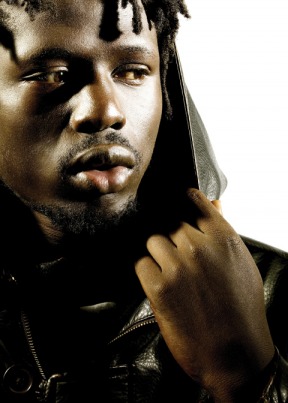War Child

By Malin Nyberg
Emmanuel Jal’s road has been long, taking him from a horrific early life as a child soldier in Sudan to centre stage at Nelson Mandela’s 90th birthday concert.
Emmanuel’s life turned around when was rescued by a British aid worker. Today he is a world famous hip hop artist fighting for nothing but peace.
“If people knew what I have gone through they would do anything to stop war,” Emmanuel says. He believes he survived the war for a reason, and now does everything he can to help children in the region.
There is a mission: to build a high-quality education centre for the whole community in Leer, southern Sudan. Jal has just returned from a university tour in North Carolina, promoting his autobiography War Child and ‘one meal a day’ campaign.
“I’m going to have only one meal a day until I’ve raised enough money to build that school,” he says. When he walks on stage at Keswick he will have eaten nothing but dinner for 99 days.
It hurts to talk about the past, but by telling people his story Emmanuel hopes to make a change for the future of his country. “I feel I have a lot to give back to my people, and education is the only way out”.
Emmanuel was only a boy when civil war between the predominantly Muslim north and Christian south of Sudan broke out. He was seven when his father was forced to join the Sudan People’s Liberation Army, and his mother died shortly afterwards. A promise of education in Ethiopia lured him and thousands of other children, but after arriving they discovered the school closed, and many, including Emmanuel, ended up being taken to SPLA training camps.
For five years Emmanuel fought, carrying a Kalashnikov over his tiny shoulders. After being forced to do many unimaginably horrible things, a bit of luck made it possible for him and a group of others to escape the soldier’s camp. Thousands of young boys trekked for four months through Africa. Tired, hungry and thirsty, many died in the jungle. Emmanuel became so desperate that at one point he considered eating the corpse of a dead friend.
After a series of harrowing events he was rescued by British aid worker Emma McCune, who smuggled him into Nairobi on a UN plane and pressed her friends to pay for his education. In Kenya Emma raised him like her own before she died in a tragic car accident a few months later, leaving Emmanuel orphaned once again.
To ease the pain of what he had experienced, Emmanuel started to sing. He joined a church choir and organised gigs to raise money for former child soldiers. Then he discovered rap, and began to realise he could use it to get a message across.
“I believe that if people are being given the right information in the right time, and in the right place, they are really listening,” he says. “I put the story in my music”.
In 2005 he released his first album, Gua. The title track was broadcast across Africa by the BBC and became a number one hit in Kenya. Gua also earned him a spot at Bob Geldof’s Live 8 concert in the UK. His music can be heard in the movie Blood Diamond starring Leonardo Di Caprio, and in the American TV show ER.
Emmanuel’s second album, War Child, was released in May last year. Just a month later he was performing at Nelson Mandela’s 90th birthday concert in London’s Hyde Park, something he describes as unreal. “It was such an honour to be there, unbelievable. Mandela means a lot to me.”
For the past four years Jal has been based in London, but he doesn’t see much of the city. “Unfortunately I am always away campaigning,” he says, adding that he really likes the place. “I feel safe in London.” He often visits America, and in 2008 his return visit to Sudan became a full-length documentary on his life. The film — also called War Child — premiered at the Berlinale
festival last year and won the audience choice award at the Tribeca Film Festival.
Does he ever get angry when he sees the differences between the rich western world and Sudan?
“No”, he says. “I understand the situation. Every person has their own problems, and every country has its own problems. You can’t blame the people. I just take this opportunity to strengthen myself and to use my voice, speaking up for the people of Sudan.”
On February 12 Jal visited the New York Stock Exchange to ring The Closing Bell, commemorating Black History Month, a remembrance of the people and events in the history of the ancient African Diaspora.
It is celebrated annually in the United States and Canada in the month of February, although here in the UK it is held in October.
Emmanuel is performing in Keswick at Main House on 6th of March, three days after the release of his autobiography War Child.
To support Emmanuel's campaign, please visit www.gua-africa.org
